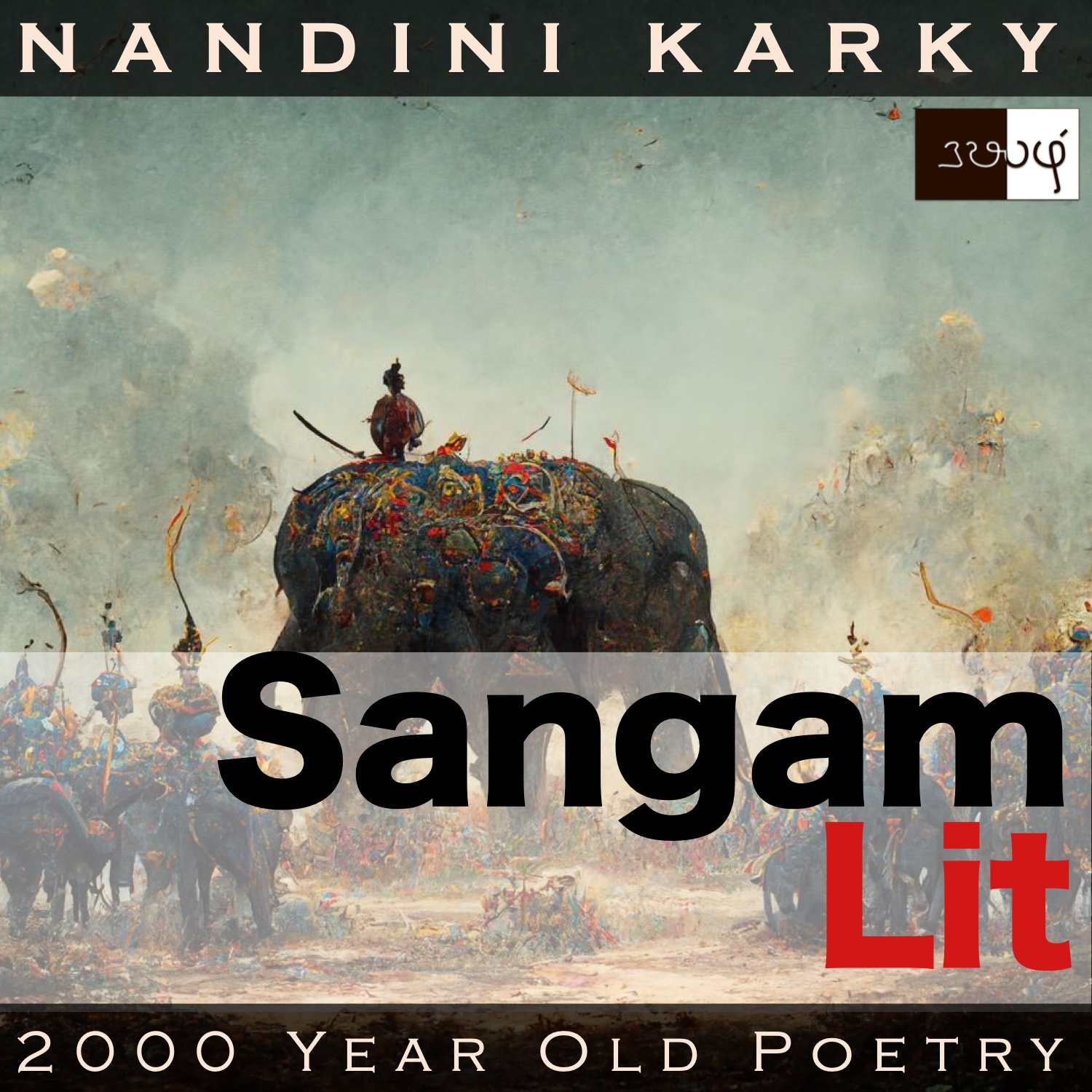Podcast: Play in new window | Download
Subscribe: Apple Podcasts | Spotify | Amazon Music | Android | iHeartRadio | TuneIn | RSS | More

In this episode, we listen to a description of a king’s land, as depicted in Sangam Literary work, Puranaanooru 13, penned about the Chozha King Mudithalai Koperunarkilli, by the poet Uraiyur Enicheri Mudamosiyaar. The verse is situated in the category of ‘Paadaan Thinai’ or ‘praise of a king’ and wishes safety for the king, who finds himself in a precarious situation.
‘இவன் யார்?’ என்குவை ஆயின், இவனே
புலி நிறக் கவசம் பூம் பொறி சிதைய,
எய் கணை கிழித்த பகட்டு எழில் மார்பின்,
மறலி அன்ன களிற்று மிசையோனே;
களிறே, முந்நீர் வழங்கு நாவாய் போலவும்,
பல் மீன் நாப்பண் திங்கள் போலவும்,
சுறவினத்து அன்ன வாளோர் மொய்ப்ப,
மரீஇயோர் அறியாது, மைந்து பட்டன்றே;
நோய் இலன் ஆகிப் பெயர்கதில் அம்ம!
பழன மஞ்ஞை உகுத்த பீலி
கழனி உழவர் சூட்டொடு தொகுக்கும்,
கொழு மீன், விளைந்த கள்ளின்,
விழு நீர் வேலி நாடு கிழவோனே.
A curious context is mentioned with regard to this poem. Apparently, the poet seems to be looking out from the fort of the Chera King Anthuvan Cheral Irumporai and talking to him about this Chozha king Koperunarkilli, as the latter approaches the king’s fort. Is the Chozha king laying siege to the Chera king’s fort, as is usually the case? Let’s delve into the translation of the poet’s words to find out:
“You ask me, ‘Who is he?’. He is one who wears an armour made of tiger skin, whose surface is ruined by arrows that came flying towards his vast and handsome chest. He sits atop an elephant, akin to the God of Death.
That elephant appears like a ship that sails in the seas, and also like the moon that moves amidst many stars, as swordsmen swarm around it, akin to sharks. Not heeding its tamer, the elephant is in the throes of ‘musth’. I pray that he parts away without any affliction!
In his land, farmers gather peacock feathers lying in their fields, and add these to paddy sheaths. With fleshy fish, aged toddy, and fence-like, flowing waters, spreads the country he rules!”
Time to delve into the nuances and unravel the mystery in this song. The poet starts by making it known to us that someone has asked him a question about another man. This someone is none other than the Chera king Irumporai we talked about earlier, and he wants to know who that person they are looking at just then is. In turn, the poet explains that the person they are seeing is a king wearing a tiger skin as a shield, and one that seems to have faced the fury of enemy arrows on the region close to this king’s wide chest. The reference to tiger skin is a subtle tribute to the colours of the Chozha country, which features a tiger on its flag.
From the tiger, the poet turns to the elephant, the king is sitting on appearing like the God of Death himself. Next, the spotlight falls on the elephant, which the poet places in parallel to two different similes, that of a ship in the midst of the ocean waters, and of the white moon in the midst of the star-filled sky. Favouring the ship simile more, the poet talks about how swordsmen swarm all around the elephant, akin to sharks in the sea. In the midst of this majestic image, the poet spots that the elephant is not in control, for it seems to have turned wild, and is thrashing about, minding not its tamers’ calls. At this time, the poet makes a wish that the king returns safely without any wounds from that place.
Before he concludes, the poet talks about how peacocks roam the land of this ruler and the farmers there collect the fallen peacock feathers along with the bundles of paddy they have just harvested. Not only this plant food, but also, plenty of animal food in the form of fish as well delicious drinks such as well-aged toddy is to be found in the king’s land, made fertile by the roaring river which acts as a wall to the nation, the poet says. The roaring river mentioned here is none other than the Kaveri river, which flowed through the Chozha lands, making them the rice bowl of the ancient world, no doubt.
Taking in these words of the poet to the Chera king about another ruler from another land, it becomes clear that the Chozha king is not waging war just then. For how would the poet wish well for another king if he’s about to attack the king he is talking to? Some sources do mention that it was a friendly visit by the Chozha king to this Chera king’s palace and this is the moment the poet chooses to celebrate and wish well for the Chozha king. Thanks to this verse of a king’s praise, we get to explore the riches of a river-fed ancient nation!




Share your thoughts...